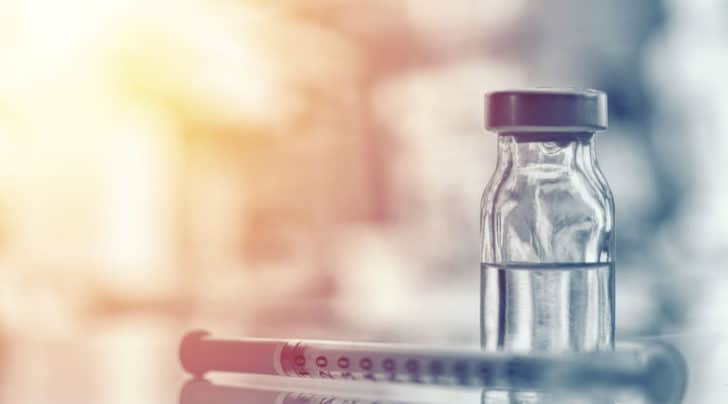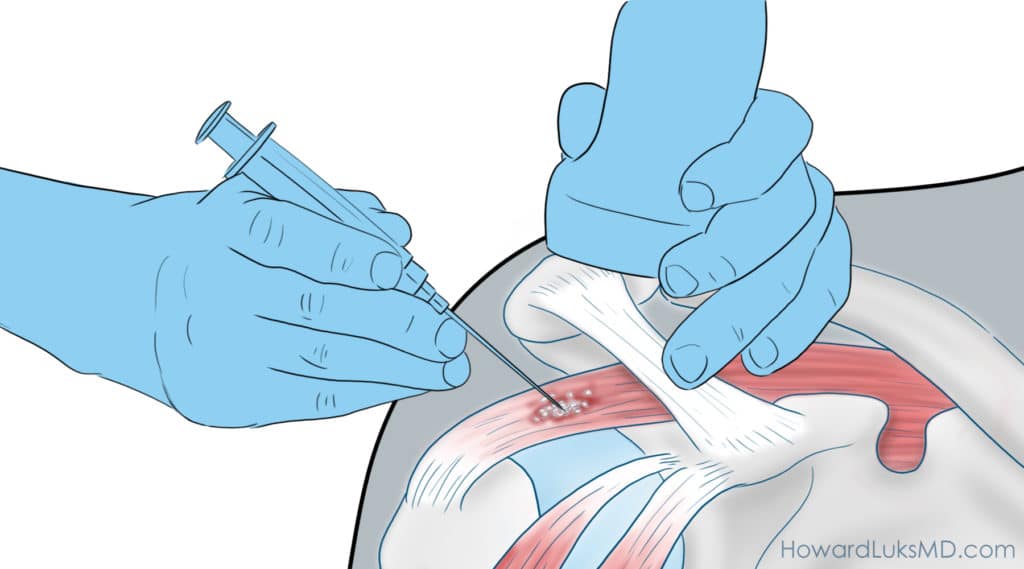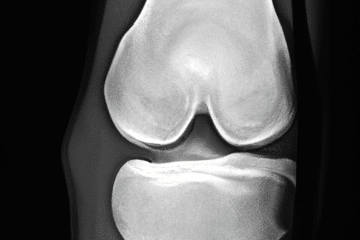
Cortisone or steroid injections are utilized commonly by Orthopedic Surgeons, Rheumatologists, and Pain Management Physicians to manage inflammation and pain due to knee osteoarthritis, shoulder bursitis, back pain, and Rheumatoid disease. Cortisone, a form of steroid, can have effects on our immune function. Covid-19 vaccinations are taking place all around the globe. Tens of millions of vaccinations have already been administered. Do steroid injections interfere with the covid-19 vaccinations? Maybe.
How should you time your steroid injection if you are planning on getting the Covid-19 vaccination?
How do vaccinations work to confer immunity to Covid-19?
When you are vaccinated, the goal is to get your immune system to react to the vaccine and produce antibodies and alert specific cells to be on the lookout for the SARS-CoV-2 virus. When successful, the vaccine uses your immune system to produce antibodies against portions of the spike protein that the virus uses to attach to our cells and infect us.
If the virus cannot attach to our cells, it cannot enter the cell and replicate. The vaccine also causes our immune system to produce a “cellular” immunity. Cellular immunity occurs when specific white blood cells in your body are taught to recognize the spike protein. These cells will lie asleep or dormant unless the virus is seen in your body. Then these cells will wake up and produce antibodies against the spike protein. These cells can also activate other cells or recruit their friends to battle against the virus.
This is also why the current mRNA vaccines from Pfizer and Moderna require two doses. The first dose wakes up your immune system and starts the process of antibody production. A few weeks later, the second injection revs up your immune system further to make more antibodies and produce the cellular component of the immune response I just mentioned.
mRNA vaccines require a well-functioning immune system to help you have the most protection possible against the virus that causes Covid-19.
Steroid or cortisone injections and your immune system
Steroids (cortisone) affect your immune system. That effect will be dose-dependent. That means that the more steroid you receive, the more significant the impact on your immune system function. Will a single steroid injection into your knee, shoulder, hip, or elbow affect your immune system? Maybe. We aren’t sure. No data has been published yet concerning how steroid shots will affect your response to the COVD-19 vaccination. However, there is some evidence that steroid injections can increase your risk of getting the flu (6). But there are no studies that show whether or not a steroid injection increases your risk of getting Covid-19.
Given that millions of people worldwide are currently being vaccinated against covid-19, and given that hundreds of thousands of steroid injections are given to patients around the globe every day, I think it makes sense to offer some guidance in this situation.
These are not my personal recommendations… the recommendations below are from multiple medical sources.
Steroid injections can also affect your body’s hormone production. We have different types of steroid injections available to us. Each has a slightly different effect on our hormones. Some of the most commonly injected steroids for joint or tendon pain will diminish certain hormones in our body, such as cortisol, for up to a few weeks. Cortisol is an essential regulator of various processes in our body. While steroid injections appear to be helping patients with covid-19 later in the disease process, it is currently believed that they are not helpful and potentially harmful if used early in the disease course of covid-19.
The timing of steroid injections if you are receiving a Covid-19 vaccine
There are two concerns here:
- The timing of steroid injections before receiving a COVID-19 vaccination
- The timing of steroid injections after receiving a COVID-19 vaccination.
Steroid injection before receiving the covid-19 vaccine:
If you are planning on receiving the covid-19 vaccination, and you know the date that you will be vaccinated, then based on the available research and position statements from various organizations (links below), you should wait up to 2-4 weeks after you receive a cortisone or steroid injection before having a covid-19 vaccine. The exact amount of time will depend on which steroid you are receiving and the dose you will receive. Talk this over with your doctor. If you received a cortisone injection, then you received a vaccination, do not panic. No data shows you will not generate a response to the vaccination. There is a chance that you might generate a lesser response. Again, the data isn’t in yet.
Steroid injection timing if you have already received the Covid-19 vaccination:
We want our immune system to function well after we receive the vaccine. That will enable our body to produce antibodies and the cellular components of immunity that we require to minimize our risk of becoming infected with the SARS-CoV-2 virus.
According to the manufacturers, they suggest the following (Reference 5):
- Pfizer-BioNTech COVID-19 mRNA Vaccine — Theoretically, it is unlikely for a corticosteroid injection to diminish the immunogenicity expected to be achieved by around day 28 or seven days after dose 2, and we would recommend proceeding with corticosteroid injections after this point in time.
- Moderna COVID-19 mRNA Vaccine — Based on the data that are provided in two-week intervals, we would recommend timing corticosteroid injections at around day 42 or 14 days after dose 2.
So, based on the vaccine manufacturer’s recommendations, it appears that it is best to wait until you are two weeks past your second mRNA vaccination dose before receiving a cortisone or steroid injection. If you received an injection sooner than that, it doesn’t mean the vaccination you received is worthless. It just means that you might have a lesser response. We do not know if booster shots or routine antibody monitoring will be necessary. If those recommendations appear, I will provide an addendum here as needed. [Addendum]: Booster shots are upon us. The CDC recommends booster shots for older folks, people with chronic health conditions, and those who have lower immune system function. We know that spike protein antibody levels are dropping over time. The data out of many countries shows that this appears to coincide with an increase in breakthrough infections. If you are in one of the groups currently approved for a booster shot, then the same recommendations above concerning the timing of the booster before or after a cortisone injection holds. It appears that the more robust our response to the vaccination is, the better protected we are. Therefore, avoiding steroid injections (if possible) for a short while before and after your booster appears to be salient advice.
Keep in mind, for certain patients, such as those receiving neuraxial (spine, epidural) injections for pain relief, these injections improve pain and therefore decrease the stress associated with pain and improve sleep. Both reduced stresses due to pain and an increase in sleep improve your immune function. If the (potential) effect of these injections on your response to the COVID-19 vaccination is small, then it may very well be worth it for you to proceed with the injection. These are important considerations that you and your doctor should explore when considering how to time your cortisone injection around a COVID vaccination (7).
References:
- Burns CM. The History of Cortisone Discovery and Development. Rheum Dis Clin North Am. 2016 Feb;42(1):1-14, vii. doi: 10.1016/j.rdc.2015.08.001. PMID: 26611547.
- Sytsma TT, Greenlund LK, Greenlund LS. Joint corticosteroid injection associated with increased influenza risk. Mayo Clin Proc Innov Qual Outcomes 2018; 2:194-198.
- Abdul AJ, Ghai B, Bansal D, Sachdeva N, Bhansali A, Dhatt SS. Hypothalamic pituitary adrenocortical axis suppression following a single epidural injection of methylprednisolone acetate. Pain Physician 2017; 20:E991-E1001.
- Habib G, Jabbour A, Salman J, Hakim G, Haddad H. The effect of epidural methylprednisolone acetate injection on the hypothalamic-pituitary-adrenal axis. J Clin Anesth 2013; 25:629-633.
- Spine Intervention Society, here
- Sytsma TT, Greenlund LK, Greenlund LS. Joint Corticosteroid Injection Associated With Increased Influenza Risk. Mayo Clin Proc Innov Qual Outcomes. 2018 Mar 20;2(2):194-198. doi: 10.1016/j.mayocpiqo.2018.01.005. PMID: 30225449; PMCID: PMC6124339.
Ginzler E, Diamond H, Kaplan D, Weiner M, Schlesinger M, Seleznick M. Computer analysis of factors influencing frequency of infection in systemic lupus erythematosus. Arthritis Rheum. 1978 Jan-Feb;21(1):37-44. - American Academy of Orthopedic Surgery Position Statement
-
Krishnan Chakravarthy, et al. Recommendations and Guidance for Steroid Injection Therapy and COVID-19 Vaccine Administration from the American Society of Pain and Neuroscience (ASPN),J Pain Res. 2021; 14: 623–629; PMCID: PMC7944369 – Note: These authors are highly conflicted based on industry ties.















I had a facet Cortizone injection for shoulder pain on March 4 . I then had the Pfizer 1 vaccine on March 8 . Should I keep the appointment for the second vaccine scheduled for March 29 . If so, how effective will these vaccines be considering I had a steroid injection? How do I know the level of antibodies in my system? I am 68 years old and am very concerned. Would appreciate your advice.
Keep the appointment for the second shot
I’m scheduled for a J&J vaccine tomorrow and i had a steroid shot just 9 days ago for an ear infection. Should i cancel my appointment till later ?
No need to reschedule. Just understand there might, repeat might be a diminished response. No one knows for sure.
I just had Cortisone shots, one in each knee, yesterday, 3/9/21. I was able to schedule my Covid vaccine next Tuesday, 3/16/21. It is SO difficult to schedule an appointment in my area, that I am reluctant to cancel this appointment. I was told to wait at least 2 weeks after the shots in my knee, however, I really want to get the vaccine, as I am traveling next month. How important is it, really, to wait the additional week?
No need to reschedule. Just understand there might, repeat might be a diminished response. No one knows for sure.